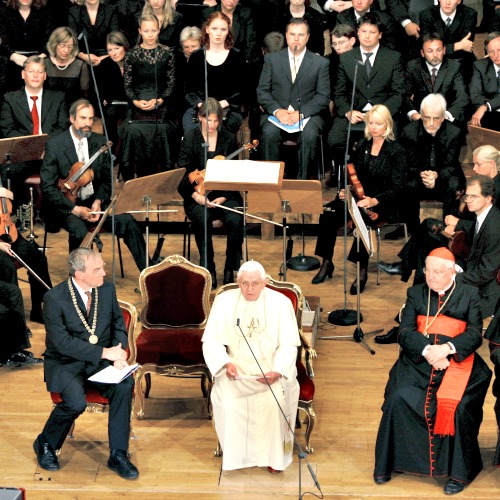The Long View 2006-09-15: The Benedictine Jihad

Pope Benedict XVI speaks to students and professors at the Auditorium Maximum of the University of Regensburg in Regensburg, Germany, Sept. 12, 2006. (Matthias Schrader/picture-alliance/dpa/AP Images)
Pope Emeritus Benedict later gave a speech in Jordan that is sometimes described as an anti-Regensburg speech, but I honestly think he really believed what he said both times.
The Benedictine Jihad
Guy Fawkes Day came early in the Muslim world, to judge by these scenes of effigies of Benedict XVI being burned. The cause of the commotion is the address that Benedict gave at the University of Regensburg earlier this week, Glaube, Vernunft und Universität: Erinnerungen und Reflexionen.(Faith, Reason, and the University: Memories and Reflections). An English version is available here. This assessment may be premature, but it looks as if this could turn into a worldwide campaign comparable to the Cartoon Jihad. Unlike that earlier episode, the reaction to Benedict's remarks does not seem to have been planned in advance. However, the earlier incident created a network for disseminating disaffection of this sort. The Benedictine Jihad will provide an instructive test case, not least because, this time, the criticism of Islam was real.
I discussed the pope's remarks earlier here. In this entry, I would just like to summarize more precisely what he said. As the title of the lecture suggests, Benedict's subject was the intellectual climate of the universities. He was making the same kind of argument that John Cardinal Newman (and Allan Bloom, for that matter) made for "liberal education." Benedict's understanding of the matter is that the concept of "reason" has to be expanded beyond the physical sciences to include the liberal arts and theology: each discipline with its own methods, but each a necessary part of the life of the mind. The interesting aspect of the lecture was the historical dimension.
Benedict argues that Greek philosophy and Hebrew thought as expressed in the Old Testament converged on the same high evaluation of reason. The culmination of this convergence is the first sentence of John's Gospel: "In the beginning was the Word." The term for "Word" here is "logos," the rational aspect of the world in Greek philosophy and term that John applies to Jesus. Thus, Christianity is, in its essence, both Greek and Hebrew; the place where these traditions meet is reason. It is this "reason" that Christinaity proclaims as the human face of God. It is also, the pope reminds us, the metaphysical principle that created Europe.
As Benedict points out, this position has become controversial. The late Scholastics moved away from the the sort of confidence in reason that we find in the theology of Thomas Aquinas. Rather, the late Scholastics argued that God was wholly transcendent and cannot be apprehended even in part by reason, even by analogy. The extreme view of the sovereignty of God that we find especially in some forms of Calvinism continued that trajectory. Pascal put this view pithily: "the God of the philosophers is an idol." In any case, what began as a preference for philosophical austerity turned into skepticism of reason as such. The result today is that reason in the academy shrank to nothing more than logical method, tolerated in the physical sciences but carefully isolated in a philosophical vacuum. As more than one commentator has pointed out during the past two centuries, this makes impossible "the university" as it was historically understood.
What put His Holiness in hot water was his observation that this rejection of reason, expressed as an understanding of God as wholly arbitrary, was an early feature of orthodox Islam. (This is true, though as Aquinas was aware, there have been Muslim theologians as keen to appropriate the Greek philosophical tradition as were the High Scholastics.) The philosophical criticism in itself is no harsher than what Benedict said of some Protestants, or even implied about some of his own academic colleagues. However, Benedict chose to make the point through statements made in 1391 by the Byzantine Emperor Maunel II Palaeologus, to the effect that Islam was inherently destructive and coercive because it conceived of God as irrational.
The Emperor Manuel was not quite the last Byzantine Emperor, but by his day the Turks had whittled the empire down to little more than Greater Constantinople. That city would fall in its turn in 1453. Manuel had little inclination to wax irenic on matters Islamic. Benedict XVI's case is by no means as desperate as the emperor's, but he seems to share the view that this is not a time when the first priority is to find common ground.
We have reached an age in which the chief defenders of reason in the classical sense are found in the Vatican. That may tell us something about the future.
Copyright © 2006 by John J. Reilly



Comments ()